St. John’s wort is an herbal extract that has a large body of research supporting its use for treating depression. It’s been studied as an alternative to more traditional antidepressants, and some scientific work even supports it for other conditions like chronic fatigue.
In addition to its effects on your brain, it may also have anti-inflammatory effects, making it useful for treating arthritis and other inflammation-related conditions.
Looking for the top St. John’s wort supplements on the market? Our research team has evaluated, reviewed, and ranked the ten best you can buy.
Research
Rankings
1. Gaia Herbs St. John’s Wort
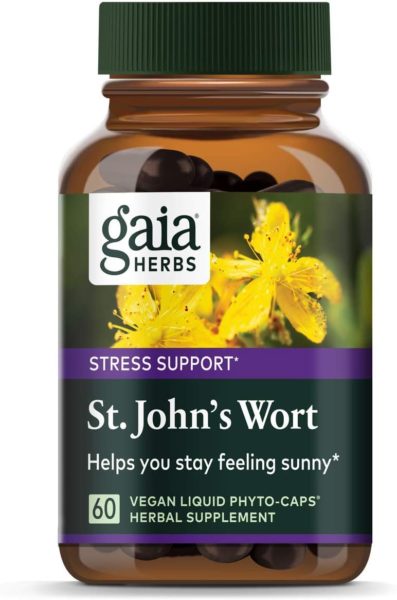
Gaia Herbs St. John’s Wort provides 450 mg of raw flower bud material per capsule, which is standardized to contain 0.9 mg of hypericum, the active ingredient in St. John’s wort, per capsule.
The super-clean and simple supplement design makes this an excellent choice for anyone who’s conscientious about extra additives and fillers in their supplements, and combined with its solid dosage, makes it our number one pick.
2. Pure Mountain Botanicals St. John’s Wort
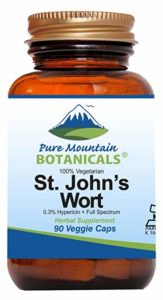
Pure Mountain Botanicals St. John’s Wort provides a solid 450 mg dosage of raw plant material and a standardized 0.9 mg dosage of hypericum.
This comes alongside a very pure and vegan-friendly capsule, with zero additional ingredients aside from cellulose to make up the capsule. It’s a strong choice if you want a quality St. John’s wort supplement.
3. Health Harmony St. John’s Wort
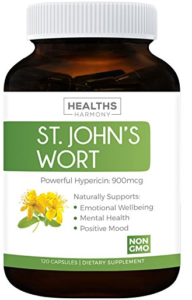
Health Harmony St. John’s Wort provides a solid dosage of St. John’s Wort. Each capsule provides 300 mg of extract, plus 200 mg of St. John’s wort powder.
The effective dosage is 0.9 mg of hypericum, which is in line with what’s used in a lot of clinical research. The supplement design has a few extra fillers and binders, but aside from this, it’s a pretty good product.
4. NOW Mood Support
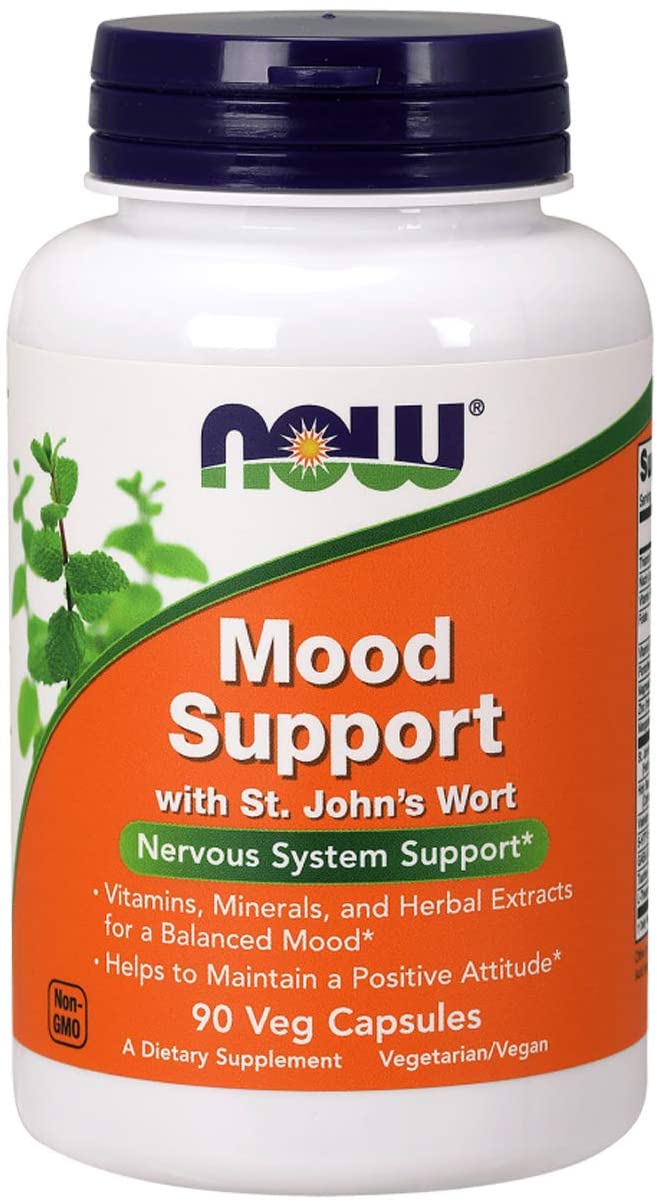
NOW Mood Support is something of a “maximalist” St. John’s Wort supplement—along with a solid dosage of St. John’s wort, it provides a broad range of compounds and herbal extracts to support a stable, positive mood, including valerian root, vitamin B12, GABA, and 5-HTP, to name just a few. If you’re specifically looking for a St. John’s wort supplement that comes with a broad range of synergistic ingredients, it’s a good choice.
5. Solaray St. John’s Wort One Daily
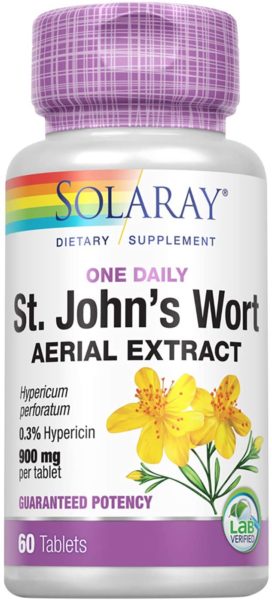
Solaray St. John’s Wort One Daily is a high-dose St. John’s wort supplement that delivers 900 mg of extract per capsule.
This means you’ll get 2.7 mg of the active ingredient, hypericum, in every capsule. For those taking a higher dosage of this supplement, it’s an easy way to get all of your dosage in using just one tablet, but it hurts your ability to follow the protocol of some clinical trials, which split the dosage up into two or three tablets taken at different times of day.
6. VitaStrength St. John’s Wort
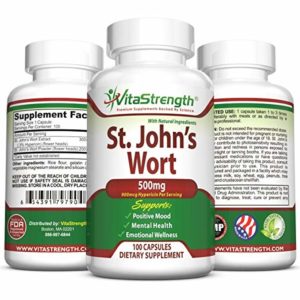
VitaStrength St. John’s Wort provides a standard mix of 300 mg of St John’s wort extract plus another 200 mg of powder, and like many other similar supplements, you’ll get 0.9 mg of hypericum per capsule.
The supplement design isn’t the cleanest; purists would likely prefer something without magnesium stearate and silicon dioxide, but as far as the active ingredients go, it’s still pretty good.
7. Horbaach St. John’s Wort
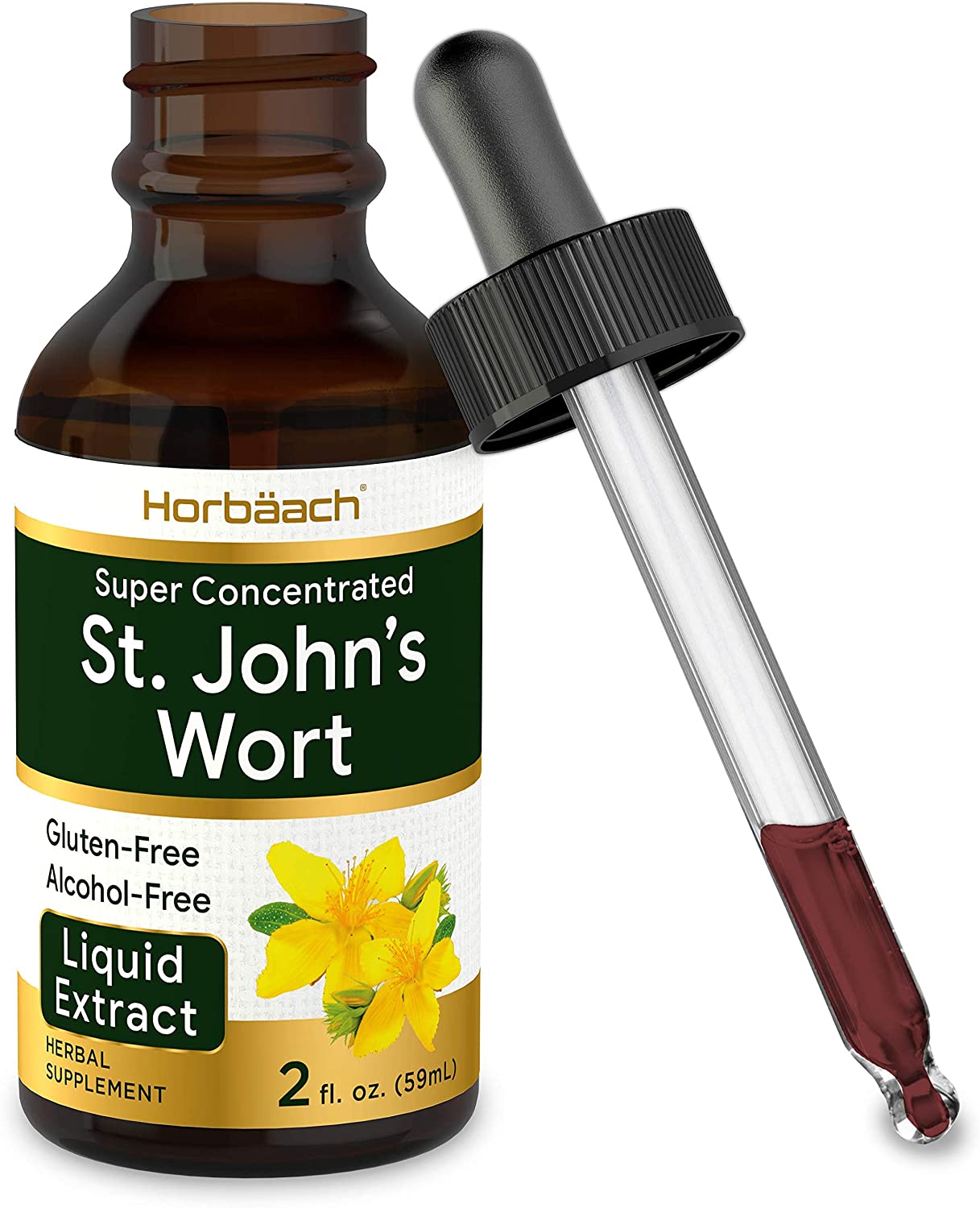
Liquid form St. John’s wort isn’t right for everyone, but if you do fit into this niche, Horbaach makes the best liquid supplement out there. For corner cases like people who don’t like swallowing capsules, or who want to add St. John’s wort to custom shakes, smoothies, juices, or herbal teas, it’s a good choice.
8. Nature’s Way St. John’s Wort
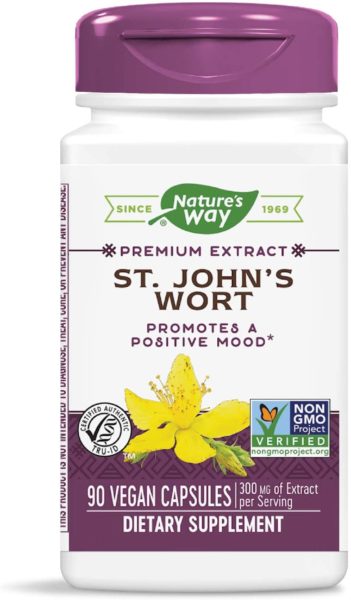
Nature’s Way St. John’s Wort has a strong dosage of 700 mg of St. John’s wort per capsule. The supplement design is very clean, with the only ingredient aside from St. John’s wort being the cellulose needed to make this vegan-friendly capsule.
The main downside to this supplement is that the hypericum content isn’t standardized, so it’s hard to determine the precise dosage of the active ingredient.
9. Oregon’s Wild Harvest St. John’s Wort
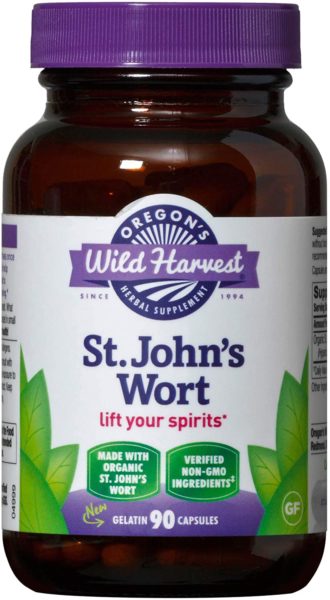
With 350 mg of raw plant material per capsule, and no additional ingredients aside from the cellulose capsule, Oregon’s Wild Harvest St. John’s Wort is a very pure and simple supplement.
The only downside is the hypericum content is not standardized, so the precise amount of active ingredients that you are getting isn’t completely clear.
10. Herb Pharm St. John’s Wort
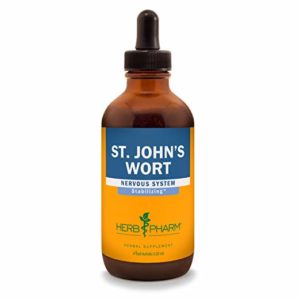
Herb Pharm provides St. John’s wort extract in a liquid form. The dosage is equivalent to approximately 460 mg of raw plant material per serving, though the actual hypericum content is not listed. Because of this, it ends up lower in our rankings.
Category winners
Best St. John’s wort overall: Gaia Herbs St. John’s Wort
Gaia Herbs St. John’s Wort garners our top overall spot thanks to its simplicity, clean supplement design, and carefully-controlled dosage. If you’re looking to mimic the doses used in the best scientific studies on St. John’s wort, Gaia Herbs is the way to go.
Best St. John’s wort for depression: Gaia Herbs St. John’s Wort
Depression is the best-studied of the applications of St. John’s Wort, and among the products on the market that comes closest to the formulations used in clinical research, Gaia Herbs is best. Taken daily, it’s one of the best supplements out there for depression.
Best St. John’s wort for having more energy: NOW Supplements Mood Support
NOW Supplements provides St. John’s wort alongside other energy-supporting compounds like holy basil, GABA, and vitamin B12, making it an unusually robust supplement for supporting high overall energy levels.
Best St. John’s wort for anxiety: Gaia Herbs St. John’s Wort
Gaia Herbs, our top overall pick, is also our choice for anxiety. Its ultra-simple formulation and its effective dosage make it the best option out there when it comes to St. John’s wort supplements for anxiety.
Best liquid St. John’s wort: Horbaach St. John’s Wort
Looking for a liquid-form St. John’s wort, either because you don’t like taking capsules or because you want to mix it into shakes, smoothies, or juice? Horbaach is a great solution: it provides an alcohol-free water-based solution of concentrated St. John’s wort extract that’s easy to use and easily absorbed.
Best St. John’s wort for libido: Gaia Herbs St. John’s Wort
St. John’s wort isn’t just for boosting your mood—many people find it’s also a great way to elevate your sexual desire. For this use case, our recommendation is Gaia Herbs St. John’s Wort, due to its simple formulation and well-calibrated dosage.
Who should buy St. John’s wort?
St. John’s wort is considered safe for most individuals looking to help treat depression, symptoms of menopause, and emotional distress. There has also been some research showing it can improve wound healing, making it ideal for those with recent injuries.
Since St. John’s wort helps treat depression, it tends to interact with many medications such as Xanax, birth control, Lanoxin, and Gleevec (amongothers). Speak to your doctor before taking St. John’s wort if you are on any type of medication.
Pregnant and breastfeeding women should avoid St. john’s wort as it is possibly unsafe in these types of populations. Children should also avoid it due to the lack of research. People who are prone to maladies of the brain, like Alzheimer’s, should avoid St. John’s Wort.
If you are going to undergo surgery, its best to avoid St. John’s wort attest two weeks before surgery, as it has been shown to cause heart complications when combined with anesthesia. It may also affect serotonin levels in the brain in these patients, making it all that more important to avoid it around surgery.
How we ranked
The first thing we looked at when ranking the best St. John’s Wort supplements was the ingredients. In general, we wanted pure St. John’s Wort supplements with nothing added. Proprietary blends and anti-anxiety blends were axed for this reason. We also looked for supplements with at least 0.9mg of hypericum per serving. This is why you’ll find products like Gaia Herbs and Health Harmony ranked so high on our list.
Next, we looked at the delivery method. There are two forms of delivery for St. John’s Wort: liquid drops and capsules. We preferred capsules over liquid drops because it was easier to have accurate and reliable dosing. This is why you’ll find Herb Pharm so low on our list.
Purity was of the utmost importance for this type of supplement. Since St. John’s wort can interact with a variety of supplements, it needs to be as pure as possible. As such, we preferred products like Now, and Pure Mountain Botancials that included no fillers, artificial ingredients or coloring agents.
Benefits
St. John’s wort has been successfully used to treat depression. Based on its long history as an herbal remedy, St. John’s wort has been examined intensively for its ability to improve the symptoms of depression.
A meta-analysis of all of the clinical trials to date was conducted in 2008 by the Cochrane Collaboration, an international team of medical researchers which reviews clinical research and makes evidence-based recommendations (1).
They looked at 29 different studies, which in total included over 5,000 people with depression. St. John’s wort compared favorably to placebos, with the pooled evidence showing significantly greater improvements in people on St. John’s wort supplements.
Further, St. John’s wort was found to be similarly effective to more commonly-prescribed antidepressant drugs like SSRIs—studies which compared an SSRI to a St. John’s wort supplement found no difference in outcomes.
St. John’s wort may have fewer side effects than traditional antidepressants. The same review by the Cochrane Collaboration concluded that St. John’s wort has fewer side effects compared to a traditional antidepressant.
SSRIs are known for a range of burdensome side effects, such as weight gain, nausea, dizziness, and deteriorations in sexual function (these can be so bad for men that many turn to male enhancement pills to address them).
In contrast, St. John’s wort tends to have, for most people, a lower risk and lower severity of side effects. One review study published in 1996 in the British Medical Journal looked at the incidence of side effects in people taking SSRIs versus people taking St. John’s wort (2).
The study reported that side effects occurred in 53% of patients on standard antidepressants, but only 20% of people taking St. John’s wort.
We’ll look at the side effects profile of St. John’s wort in-depth later, but this simple reduction (over two-fold) of side effects is very encouraging.
St. John’s wort also acts as an anti-inflammatory. In addition to its well-documented antidepressant properties, St. John’s wort appears to fight against inflammation, which could make it useful for conditions like arthritis.
According to a study published in the Journal of Pharmacology and Experimental Therapeutics, the active ingredient in St. John’s wort inhibits specific biochemical pathways related to inflammation (3).
In this study, the researchers demonstrated that St. John’s wort down-regulates specific DNA activity related to inflammation.
This has not yet led to clinical studies on treating inflammatory conditions like arthritis, but it indicates that such studies might be feasible.
Depression itself has been linked to inflammation, so this might explain the connection: a study published in 2009 in the journal Brain, Behavior, and Immunity demonstrated that depression is often associated with increased levels of biomarkers of whole-body inflammation (4).
It may be that reducing inflammation is part of how St. John’s wort aids in improving your mood and reducing depression.
St. John’s Wort could reduce symptoms of chronic fatigue. Chronic fatigue is one condition that has been linked to both poor mental health and to overall inflammation, so it shouldn’t be surprising that St. John’s wort has been found to be beneficial for its treatment.
A study published in the journal Phytomedicine by a team of researchers at the University of Exeter in the United Kingdom described using the active ingredient in St. John’s wort for this purpose (5).
The study enrolled twenty patients with chronic fatigue symptoms and tracked their symptoms over the course of six weeks.
The researchers found that the patients all improved while taking the supplement, and connected this improvement with the presence of depression among nearly half the participants at the outset of the study.
Side effects
While the benefits of St. John’s wort are impressive, it (like any treatment for depression) isn’t without the potential for side effects.
A study published in the European Journal of Clinical Pharmacology examined the side effect profile of St. John’s wort in detail (6). According to the authors, St. John’s wort has been associated with side effects including gastrointestinal symptoms, dizziness, confusion, and tiredness.
In extremely rare cases, it has been associated with photosensitivity—the development of hypersensitive skin that burns or blisters in response to sunlight. However, these side effects are rare, and some of these side effects also occurred in placebo groups during clinical research.
St. John’s wort also has the potential to interact with prescription medication in undesired ways. One study, for example, described a number of cases of serious side effects in patients who were taking St. John’s wort in addition to normal antidepressants (7).
Because both St. John’s wort and a traditional SSRI act to increase serotonin levels in the brain, taking both together can cause serotonin levels to skyrocket to dangerous levels.
St. John’s wort also interacts with other medications, including birth control pills—when taken together, St. John’s wort can reduce the effectiveness of oral contraceptives (8).
While St. John’s wort compares favorably to traditional medications used to treat depression on a number of fronts, it does have a number of potential side effects and interactions with other medications, so it’s best used under the supervision of a doctor.
Recommended dose
Most clinical research on St. John’s wort has used standardized preparations that contain between 0.3 and 1 mg of the active compound, hypericum.
It takes several hundred milligrams of raw plant material to reach this dosage of the active ingredient, and a few studies have used doses measured in terms of raw plant extract, but the best option is to use a supplement that’s standardized for hypericum content.
Some studies have split the dosage into two or three separate capsules taken at different times of day, while others have not—there’s no clear advantage to one strategy or the other on this front.
FAQ
What is St John’s Wort? Hypericum Perforatum, better known as St John’s Wort, is a medicinal angiosperm plant that helps with treating depression and mental illness. Belonging to the family of Hypericaceae, this plant acquires the alternative name like Perforate St John’s Wort or St John’s Wort. Owing to the perforated shape of its leaves, it has a prefix of perforate being attached to it.
Where does St John’s Wort grow? This plant is native to Asia and Europe. However, it flourishes in most types of soil and can be grown in shady areas.
Is St John’s Wort edible? Yes, St John’s Wort possesses a unique astringent and is bittersweet in taste. The leaves, the flowers, and the seeds of this plant are commonly brewed to make tea. However, fresh flowers are also edible.
Why is it called St John’s Wort? Generally, the blooming period of Hypericum Perforatum blooms in the monsoon season amidst the St John Baptist’s birth anniversary. Hence, the flowering herb has acquired this name ‘St John’s.’ Likewise, Wort represents “plant.”
Is St John’s Wort actually safe to consume? Yes, St John’s Wort is generally considered safe, especially when used orally and in appropriate doses. However, it is always good to consult an expert before using it regularly as they know best whether it is going to be suitable for your body or not. A lot of times, side effects occur simply because it clashes with other drugs, chemicals, or medicine.
What happens in your body when consuming St John’s Wort? Talking about the chemical composition of St John’s Wort, it consists of active elements that react with mood affecting chemicals in your brain. Thus, by reacting with chemicals like dopamine, noradrenaline, and serotonin, it plays a pivotal role in altering your mood. This is typically why it is used as an antidepressant.
What is the best way to consume St John’s Wort? The best way to consume St John’s Wort depends upon your comfort and personal preference. You can either consume this herbal medicine in a liquid form, or you can take it in pill form. Additionally, you also have an option of drinking tea made from the extract from the leaves.
Is St John’s Wort harmful for the liver? There are no links between serum enzyme elevations or any clinically apparent liver injury with St John’s Wort. However, one must take note that since it has numerous herb-drug interactions in the body, there are increased chances that St John’s Wort may alter the effect of other medications, potentially also impacting the liver and its function.
Is St John’s Wort safe for children? Expert medical practitioners recommend that children under the age of 6 years old do not consume this herb. In contrast, under special conditions, the consumption of St John’s Wort is safer for children above the age of 6 years. Yet, it is important that this supplement is administered only after a medical consultation, as this will cut down the risk of the wrong dose or frequency.
Is St John’s Wort good for skin? Yes, it was earlier recognized as a traditional medicine that was used to treat wounds, abrasions, burns, sunburns, and even inflammatory skin disorders. St. John’s Wort is considered to have anti-inflammatory, antimicrobial, and astringent effects, which may make it suitable for treating a wide variety of skin problems or inflictions.
Can St John’s Wort cure wounds? The antiviral characteristics of St John’s Wort is believed to speed up the wound-healing mechanisms of your body.
Is St John’s Wort better than chemical antidepressants? The clinical evidence for proving the effectiveness of St John’s Wort when treating depression is still in-progress. However, it has been noticed that reactive components in extracts of hypericum can effectively be used for dealing with mild depression issues in patients with relatively low side-effects when compared to chemical antidepressants.
Is St John’s Wort anti-inflammatory in nature? Yes, herbalists believe this supplement to be extremely anti-inflammatory in nature. People have been using this medicinal herb in different forms for treating their wounds and burnt skin for many years.
Can St John’s Wort be used to control premenstrual syndrome? As an alternative medicine, St John’s Wort is known to cure depression by calming your emotions and increasing the production of brain chemicals like serotonin and dopamine. Thus, when taken in the correct dosage, it may help control extreme mood swings that may be experienced during PMS.
What happens in the case of a St John’s Wort overdose? Even though St John’s Wort is a natural herb, this does not change the fact that when taken at high dosages, there may be side effects. Some of the commonly experienced side effects when St John’s Wort is taken beyond moderate quantities include hormonal imbalances, upset stomach, headache, skin irritations, and blood pressure fluctuations.
Is St John’s Wort legally available? Yes, St John’s Wort is legal and widely available. However, across the globe, the status of this herbal medicine may vary. Some countries offer it as over the counter medicines while others need a prescription for it.
What are the precautions that need to be taken while purchasing St John’s Wort? Always remember to read the label of St John’s Wort products. These labels will give you directions on usage and dosage. It may also be beneficial to look through the label’s ingredient list, as this will give you information regarding any other additions besides the herb itself.
Is St John’s Wort dangerous for pets? St John’s Wort is considered safe for consumption by pets, including cats and dogs. However, it is always recommended to consult with your vet before giving your cat or dog any new substance.
Will St John cure anxiety? Yes, St John’ Wort is helpful to those who are suffering from mild to moderate symptoms of depression and anxiety. However, more research is required in the specific area of anxiety.
How does St John’s Wort help in dealing with menopause? There are various ways to deal with menopausal symptoms, and each symptom differs from woman to woman. However, a lot of women have found out that St John’s Wort can reduce the flashes and night sweats to an extent during menopause (2).
How does St John’s Wort help in the treatment of depression? Yes, it is widely believed that St John’s Wort works on depression. Research suggests that the herb tends to increase the activity of brain chemicals, such as noradrenaline and serotonin, which are further thought to play an important part in improving our moods. In this way, St John’s Wort is thought to be a viable treatment for depression.
Why is St John’s Wort bad for pregnancy? The presence of tannic acid in St John’s Wort may prevent the absorption of iron that is a crucial mineral for both pregnant ladies and their babies. Therefore, it is not recommended for a pregnant woman to consume this herb in any form.
Does St John’s Wort impact birth control? Possibly, there is varying evidence indicating that St John’s Wort might lower the effectiveness of birth control.
When does St John’s Wort start working? It depends on what you intend to use St John’s Wort for and your dosage. Typically, most individuals notice changes after about 4- 6 weeks. If you don’t notice any improvements, it may be best to adjust the dosage or consult with a medical professional regarding the herb.
Will St John’s Wort help me lose weight? St John’s Wort should not be used as a weight-loss product. Although there is some evidence, it may speed up your metabolism, which may help you lose weight.
Can St John’s Wort cause diarrhea? A side effect of St John’s Wort does include diarrhea and an upset stomach. If you experience this side effect, stop taking the product and consult with your doctor.
Can St John’s Wort upset your stomach? One of the side effects of St John’s Wort is an upset stomach. If this occurs, stop taking the product. Before continuing, consult with your doctor or a medical professional.
Can St John’s Wort help with anger? There is some anecdotal evidence indicating that it has helped some individuals stay calm and reduce their anger levels. However, more research needs to be done to prove that this is, in fact, possible.
Will St John’s Wort help me sleep? Potentially. St John’s Wort may help a person get a good night’s rest, particularly those with depression.
Can St John’s Wort help with quitting smoking? Possibly. St John’s Wort may help a person quit smoking by decreasing the anxiety and stress in their life. In turn, this can make the process of quitting that much easier.
Is St John’s Wort addictive? No, there isn’t substantial evidence to indicate that this herb is addictive.
Can St John’s Wort impact your eyesight? Interestingly, some research suggests the St John’s Wort may cause damage to the eye. The active ingredient, hypericin, may cause damage to the eye when the eye comes under bright light.
Is St. John’s wort proven to be effective? St. John’s wort has a long history of use as an herbal treatment to improve mood and treat depression. It’s been the subject of a huge number of clinical trials, so its dosage ranges and side effect profiles are quite well-understood.
While it does have the potential for side effects and for interactions with other medications, it also has a robust base of research supporting its use as a treatment for depression. Beyond this, it’s also been studied as an anti-inflammatory and as a treatment for chronic fatigue.
Related Articles
Recap
St. John’s wort is a powerful herbal compound that’s been used to treat depression with the same efficacy and fewer side effects than traditional antidepressants. Beyond its use in depression, it’s been explored as a treatment for chronic fatigue and it appears to exert some anti-inflammatory effects as well.
While it produces fewer side effects than a drug like an SSRI, it still has some side effects, like gastrointestinal disturbances, dizziness, tiredness, and, in rare cases, photosensitivity.
The more concerning part about St. John’s wort is its potential to interact with prescription medications, including SSRIs themselves. St. John’s wort should not be used in combination with any other antidepressant, and it’s best to consult your doctor before using St. John’s wort, particularly if you take a prescription medication.
When used properly, though, St. John’s wort appears to be a very effective supplement for improving the symptoms of depression.
For BodyNutrition’s #1 recommended St. John’s wort supplement, click here.